Surviving breast cancer as an expat
Cancer is a word that can instantly create fear, and fighting it takes immense bravery. Preethi Pranathi not only battled breast cancer with incredible courage, but her journey stands as a true inspiration. She shows women how to face such life-altering moments, accept the changes in their bodies, and navigate the emotional storm with grace. Through it all, she had the unwavering support of her mother and a circle of people who stayed calm, offered strength, and made the journey a little easier.
- Mrunal
- August 12, 2025
Boss Naari: Preethi, could you take us back to the moment when everything changed, when you first learned about your diagnosis? What kind of breast cancer was it, and how did you come to know something was wrong?
Preethi: In January 2024, I was diagnosed with triple negative variant breast cancer. During my visit to India, I found it out. So, initially I had skin irritation and a small bump in the anal area. Apart from that, there were no symptoms at all. This was the reason I took an appointment with a gynecologist on the same day I arrived in India. It was a Saturday, and since my husband was off work, we decided to go together.
During a casual conversation with the doctor, I mentioned my family history of cancer. On which the doctor suggested a routine breast checkup, which I was due for anyway. We went to another clinic she referred me to, and during the ultrasound scan, something abnormal showed up. That’s how I came to know it was cancerous. I had no symptoms. It was discovered during a routine checkup.

Boss Naari: When you heard the word “cancer,” what was going through your mind? Can you walk us through your emotional response in those early days?
Preethi: Surprisingly, when I found out it’s cancer, I didn’t cry. Maybe deep down, I had a sense this could happen. Though I never focused on it, I think somewhere I expected it because I’m a BRCA1(BReast Cancer gene1) gene mutation carrier. We found this out through genetic testing in 2018, and since my mother is also a cancer survivor, I had started routine checkups.
When the doctor examined me, her facial expression changed, and even before she said anything, I knew. I let the doctor discuss the next steps with her colleague and walked out to tell my husband with a straight face. At that moment, my mind immediately went into problem-solving mode. I kept thinking what next, what now. I’m not sure if I was really processing it, but I shifted into action quickly.
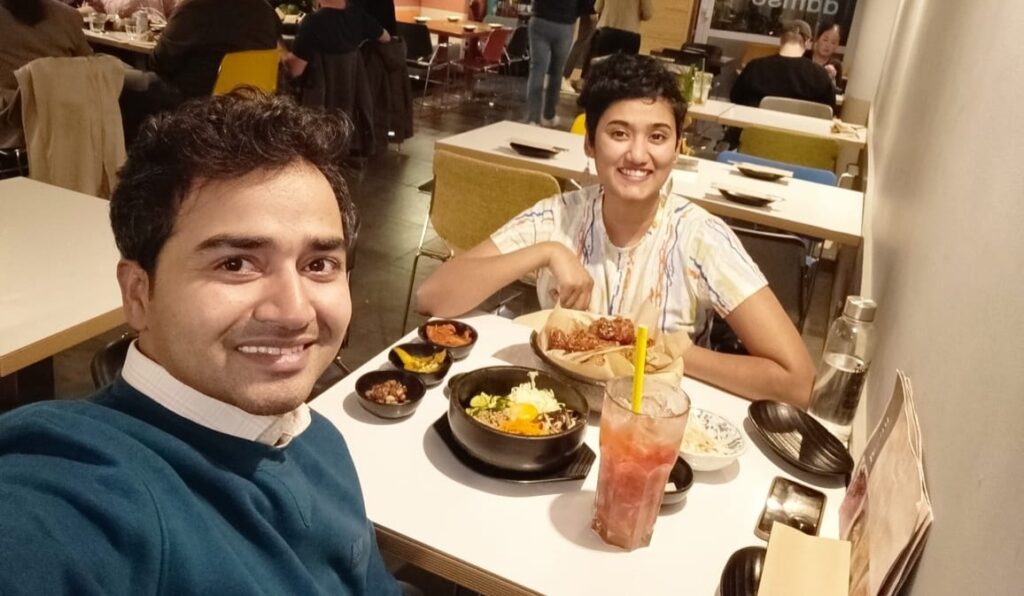
A day before chemo, Preethi went on a date with her husband at her favorite Korean restaurant.
Boss Naari: Upon learning it was cancer, did you choose to return to the Netherlands for your treatment?
Preethi: The Dutch healthcare system here really impressed me. When we received the confirmation of the cancer diagnosis in India, we immediately informed our GP in the Netherlands through the clinic portal. Since it was the weekend, I honestly didn’t expect a reply. But to my surprise, the GP responded right away, which is quite rare on weekends here. That responsiveness and the urgency she showed in following up with us made us confident in our decision to return to the Netherlands for further treatment. Once we got back, the journey became entirely different for me.
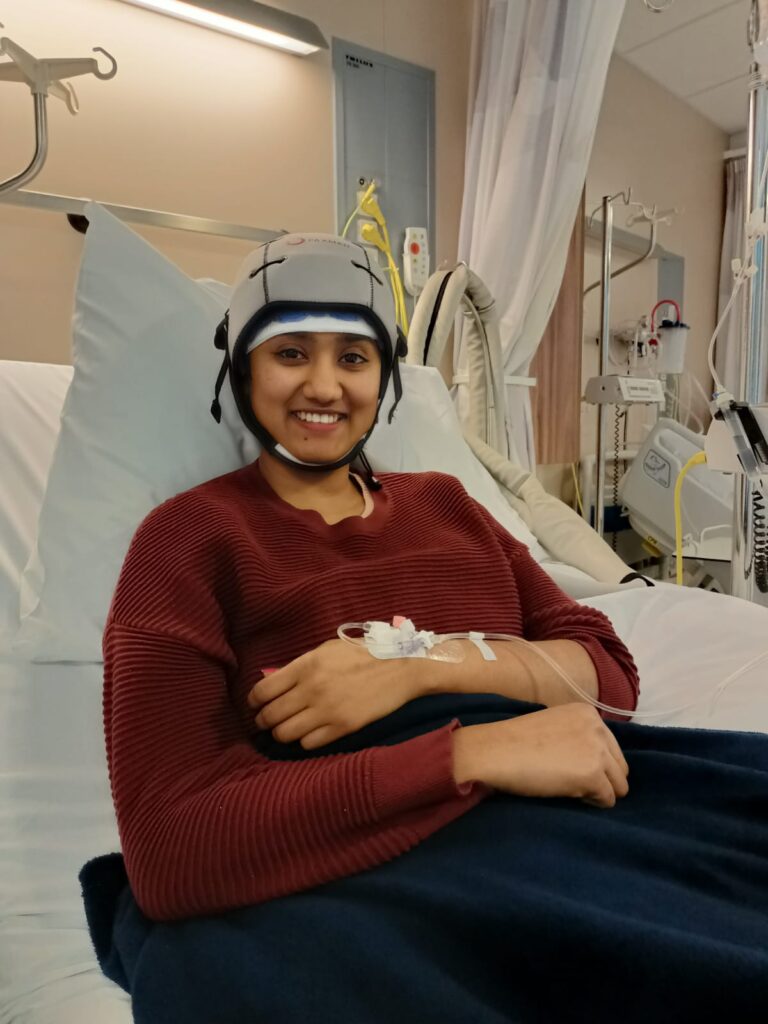
Preethi’s smile shining bright during her hospital treatment.
Boss Naari: When your diagnosis journey began, it wasn’t just about the physical treatment. How did you manage the emotional and mental weight that came with it?
Preethi:It was definitely a very tough time because my entire lifestyle had to change. Even while going through treatment, I still had roles to play. I was a mother, a daughter, a wife. I loved cooking, and I continued to do that too. In the middle of everything, I kept telling myself, this is part of it.
There were definitely many low days. Every time I hit one, I had to remind myself to keep going, and slowly it got better. Doing those everyday things helped me feel normal. One thing that truly helped me was the community I had to lean on, and that came in many different forms.
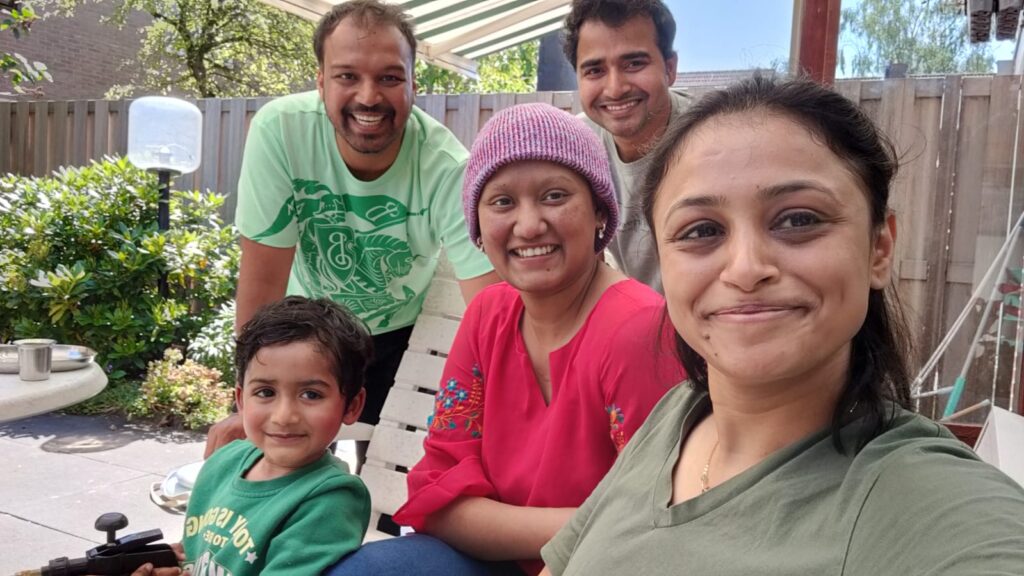
A community that never made Preethi feel alone.
Boss Naari: You mentioned that you are a mother, which is a very important and responsible role. How did you decide whether to tell your child about your diagnosis, or did you want to phase it out? What guided your decision?
Preethi: I have a son, and when my diagnosis began, he was just three years old. At that time, until we figured things out and initiated the treatment, we decided to let him stay in India at my mother’s place. That was the first time I was away from my son, as he had never been away, not even for a single night.
He lived with my mother in India for two months while I started treatment. No one had told him anything, and he didn’t know what was happening. Neither my mother nor I explained anything to him. When he returned to the Netherlands with my mother, he started noticing changes in my appearance, my frequent hospital visits, and new routines. He would ask questions in his own way, especially when I looked tired after coming home from hospital.
We used to say it was “Abbu,” a simple word he understood, which we used to describe a wound. Over time, he started picking up on the pattern. He knew I was going to the hospital and that the next two or three days would be difficult for me. So he would give me space, not jump around or come into the room. I think children sense more than we realize. He was incredibly empathetic and understanding for his age.
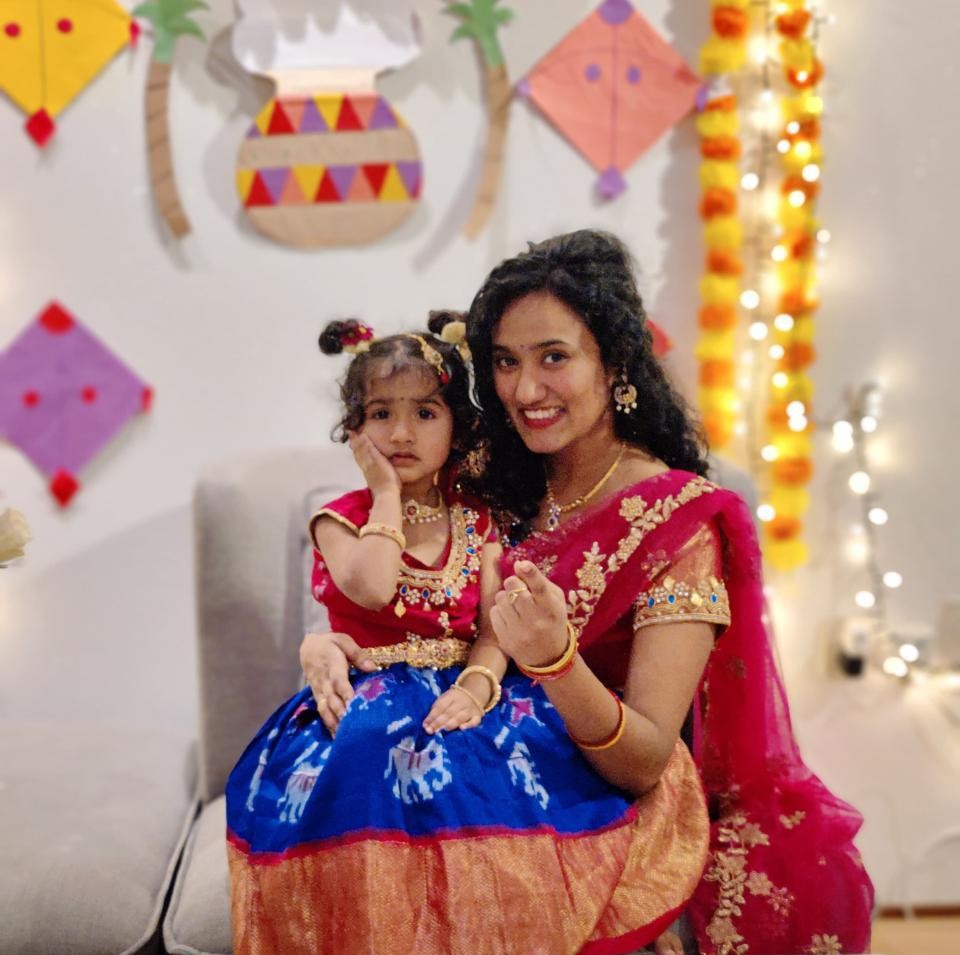
Two weeks before Preethi’s cancer diagnosis, she celebrated festival with her son dressed up as a girl.
Boss Naari: As an Indian woman living abroad, being away from your family must have been incredibly difficult. In that time, who became your pillars of emotional strength both in the Netherlands and back home?
Preethi: Being away from family is always tough. My entire support system is in India, and I’m a single child. We had just lost my father two months before my diagnosis, so there was barely any time to process anything.
Still, we made the decision to come back to the Netherlands for treatment. The Dutch healthcare system, insurance, and the responsiveness of our GP reassured us. Once we arrived, the hospital support and care impressed me.
I had a local group of friends who met me regularly. They made me feel normal. Their presence, encouragement, and appreciation lifted my spirits.
Back in India, my strongest emotional anchor was a close-knit group of college friends. We have a WhatsApp group of four, and they were like in-house doctors, constantly checking on me, researching symptoms, offering advice.
My husband was my rock. He stayed calm throughout, which gave me the stability I needed. My mother also came to the Netherlands for a few months. She’s a cancer survivor herself, and she never showed sympathy. Her attitude was always, “Okay, it’s happening then what next?” That tough love worked for me.
When she had to return to India, another family here stepped up to help, especially with taking care of my son during hospital visits. That sense of community, both near and far, truly held me up. I believe being open to receiving support makes a huge difference.
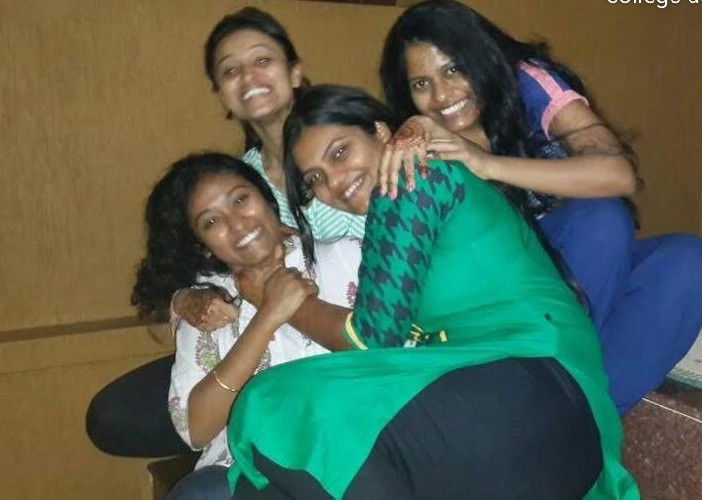
A snapshot from the past, Preethi’s friends who stood with her during her cancer journey.
Boss Naari: What was the initial phase of your treatment like? How did you ease back into your everyday routine, what activities helped you feel better, and how did you take those first steps outside your home to feel normal again?
Preethi: It was tough, especially during my initial AC chemo cycles, which were very aggressive. I felt extremely tired and was almost bedridden during those first two to three months. Gradually, I started feeling a little better as the side effects from other medicines eased.
I began going out again, first by dropping my son at daycare since it was a short distance. That was my first independent step outside the house. After that, we would go grocery shopping together, which felt like a small adventure. During that period, we also took some short trips, including a two-day trip to Luxembourg.
Cooking has always been therapy for me. During the medicine phase, nausea made it difficult to cook, but once that eased, I started cooking again and really enjoyed it. Gradually, I returned to the regular activities I used to do.
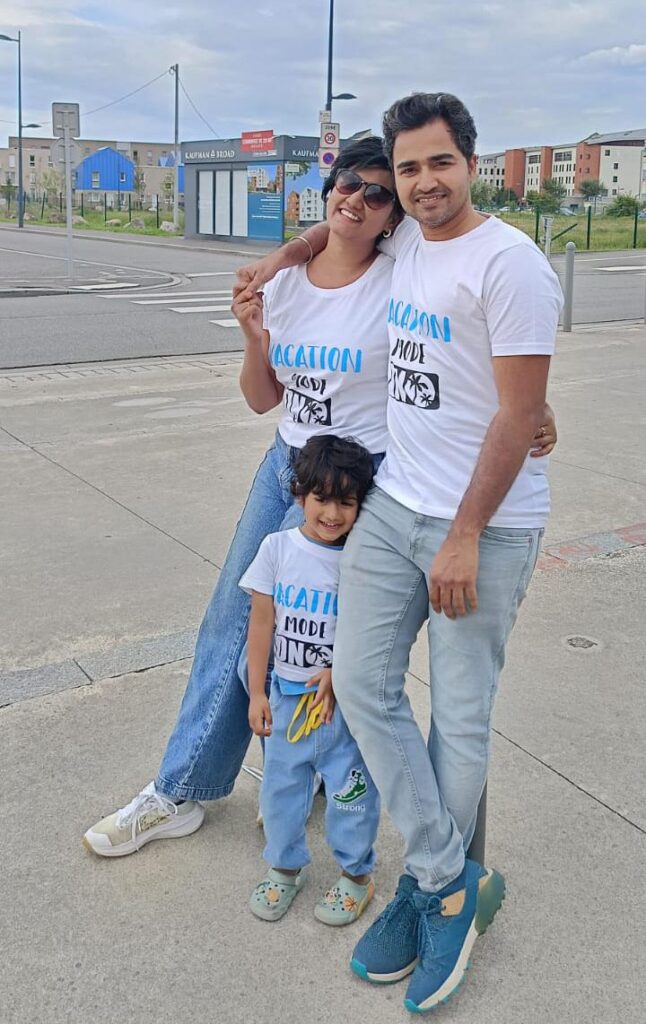
Preethi with her son and husband on vacation.
Boss Naari: Cancer treatment often changes one’s physical appearance drastically. Could you talk about how you processed and dealt with those physical transformations, and how you continued to show up for yourself?
Preethi: My physical appearance took a big hit. I had beautiful curly hair, which was the first thing my husband noticed about me when we met. Once chemotherapy started, my hair began falling out, and I had to shave my head. My husband actually shaved it for me, which felt like an irony at the time.
I bought wigs, chemo caps, earrings, and lipsticks because I did not want to stop dressing up. That was something I always enjoyed. However, seeing myself bald with brittle nails and no eyelashes or eyebrows in the mirror was hard to recognize. It did not feel like me.
I also had a chemo belly that looked like I was pregnant. There were many physical changes and infusion marks because my veins became thin, making injections difficult. Eventually, I had a large catheter placed in my body for months for easier infusions, which left some marks. It was a lot to go through all at once more than I had ever imagined. But I felt I had to look my best, not because I wanted to, but because it helped me face the journey.
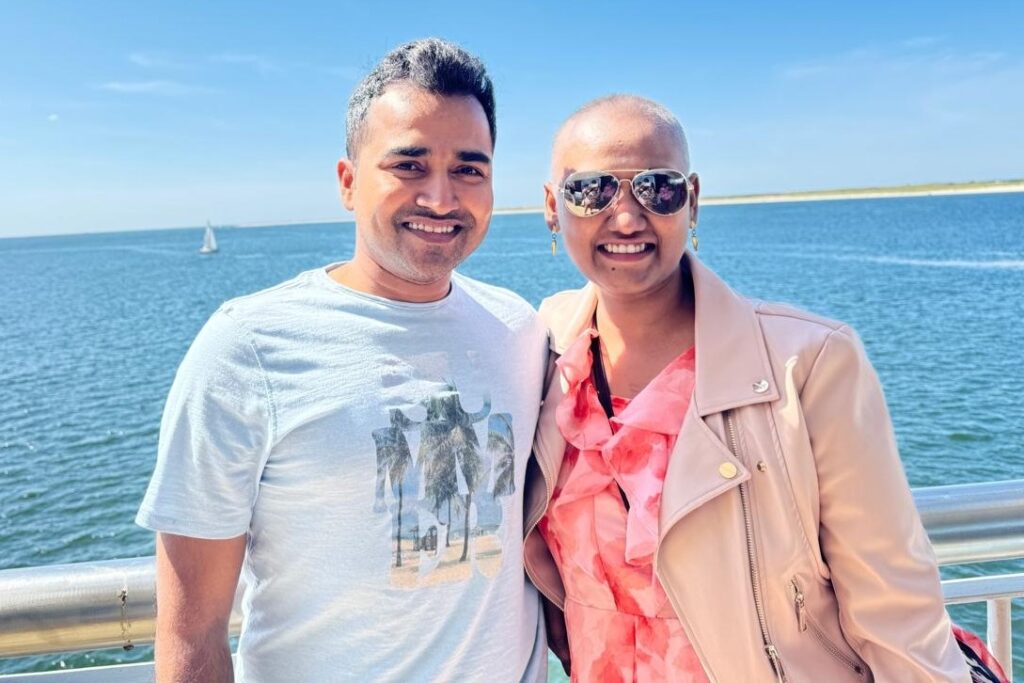
Rocking the bald look
Boss Naari: Did this entire experience change how you look at life or your own strength? Are there any personal lessons you now carry forward every day?
Preethi: Yes, definitely. After this experience, I started doing a few things differently. I stopped sweating the small stuff because I wanted to see the bigger picture and stop worrying about temporary things. My approach to life became one thing at a time, one day at a time. It is okay if life slows down sometimes, and that is something I wanted to practice. One more important lesson I learned is the value of preventive health checkups. I always tell my friends and relatives how important they are. These are some of the life lessons I carry with me and remind others about as well.
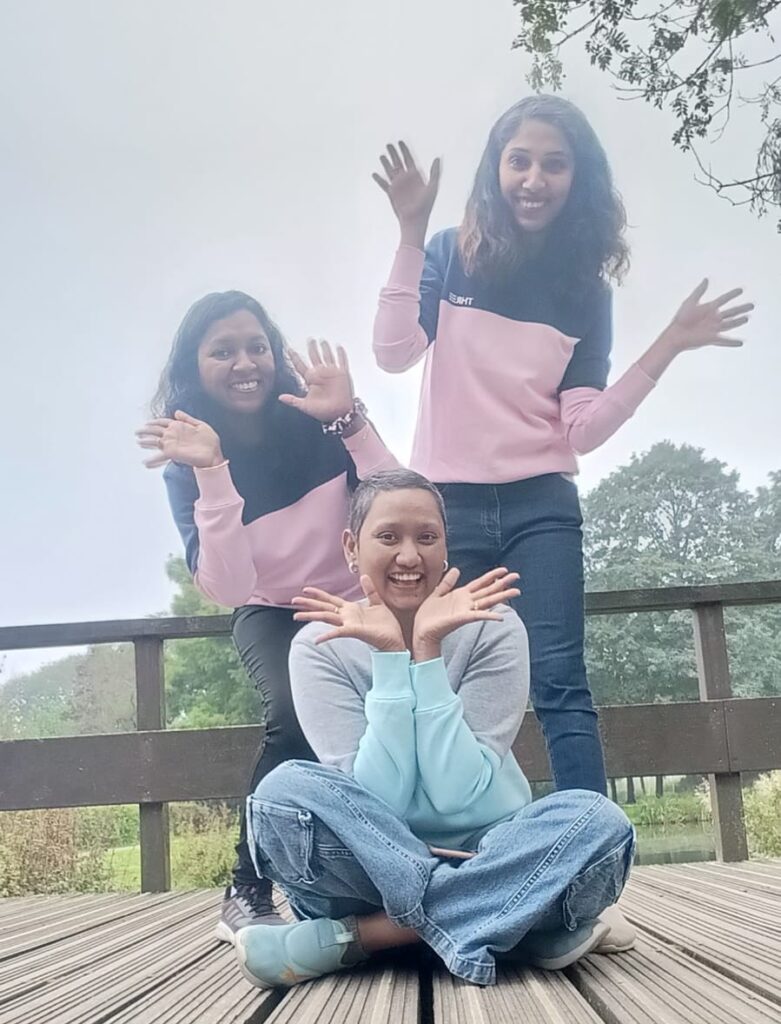
Preethi with her friends, enjoying life after the diagnosis.
Boss Naari: Even though you went into problem-solving mode early on, were there moments when everything felt too heavy, when you broke down or felt helpless?
Preethi: Yes, I did. It happened especially during my AC chemotherapy cycle. I remember one time when I had so much weakness that I could not get out of the washroom. When I finally got out, I fainted and fell on the bed. No one was in the room, and I felt very helpless. It was a moment I had never experienced before. That feeling hit hard. It made me think I was never a burden, but at that moment I started to feel that the people around me were affected by my condition. My mother had to make sure I was comfortable, and my husband and others put in extra effort to support me. That was the moment I truly felt not alright.
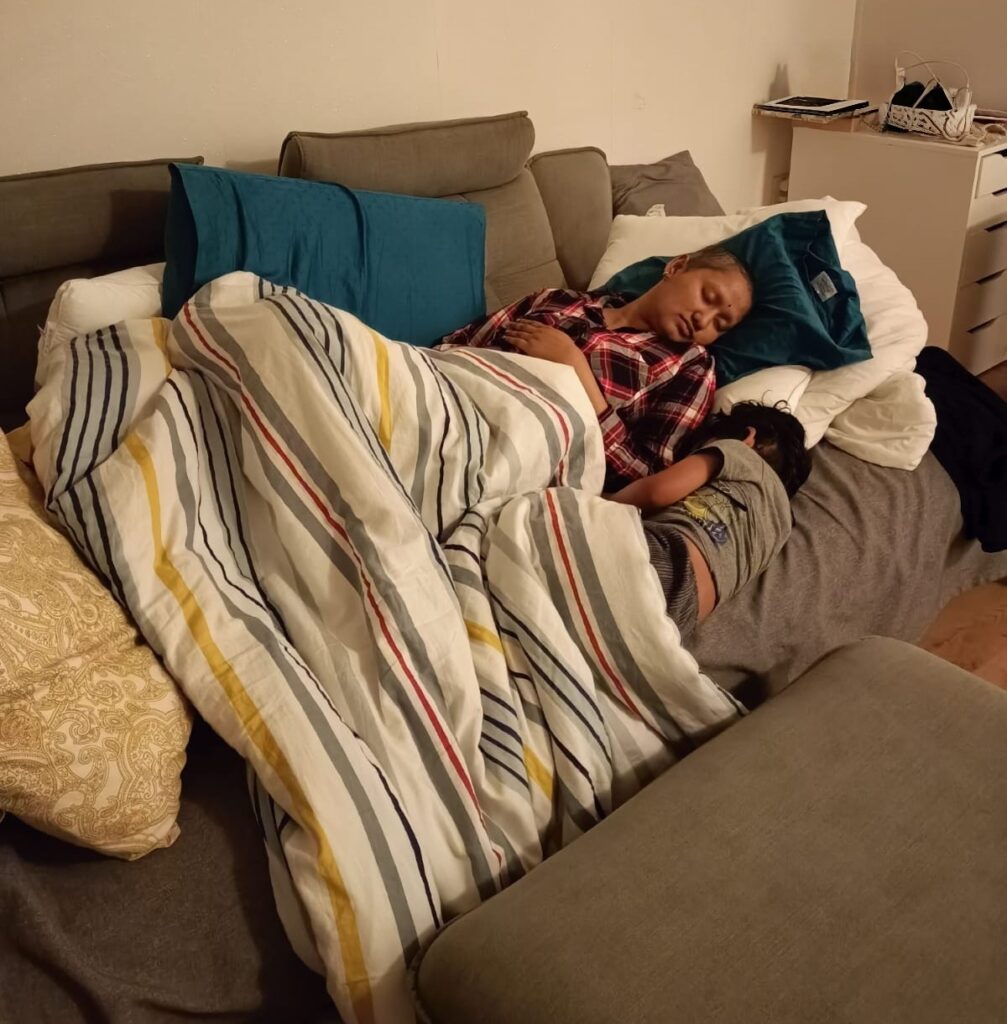
Days when Preethi was exhausted after the chemo cycles.
Boss Naari: As women, especially mothers, we’re often expected to stay strong. Did you ever feel that emotional or societal pressure during your journey?
Preethi: I think as women we are always expected to keep things together and show strength all the time, especially because we are mothers. No one told me directly to be strong, but maybe because of the way I was raised or what I observed in society, I felt that I had to. Over time I also realized that it is okay to feel sad and low when you are not alright. Acknowledging those feelings is important. But after that, you must gather yourself and move forward. That is what matters most to me.
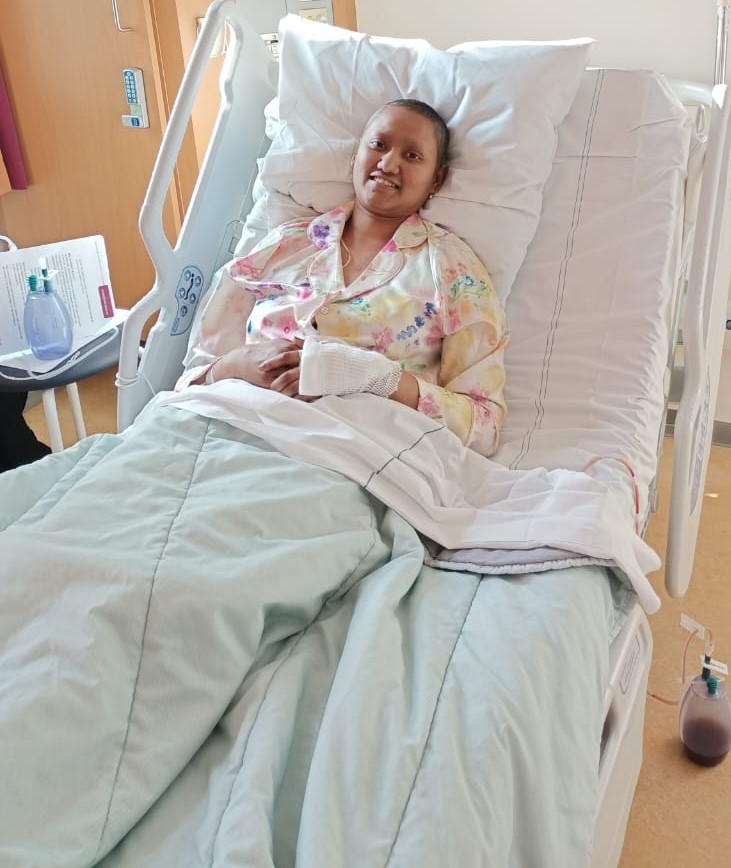
Photo of Preethi, captured after her surgery.
Boss Naari: You mentioned carrying a genetic mutation. What are the long-term steps or preventive decisions you now have to consider, and how are you navigating those possibilities?
Preethi: So, my experience with the healthcare system here in the Netherlands was very different from what I had seen back in India with my mother’s treatment. Here, the doctors were very transparent and collaborative. They clearly explained my options. I was given two choices: either breast-conserving surgery or a complete removal, which is a mastectomy.
I also took a second opinion in India, and when I discussed it with the doctors here, I felt like they were genuinely suggesting what would work best for me in the long run. Since I was diagnosed with triple-negative breast cancer, they recommended a mastectomy, meaning removing my left breast where the cancer was.
Even though my tumor was small and caught early, we carefully thought through all the options. Eventually, I decided to go ahead with the mastectomy. I also chose to remove my right breast as a preventive measure. So, I had a complete bilateral mastectomy.
After treatment, the follow-up care here mainly involves a yearly physical exam without regular scans or ultrasounds, unlike in India where these tests are more frequent in the first few years because the chance of recurrence is higher. That made me realize how important it is to be proactive about screening, especially when I’m back home.
Also, since my cancer is linked to a genetic variant that increases the risk of ovarian cancer, my doctors suggested I consider removing my ovaries as a preventive step. I’m still thinking about that and plan to make a decision a few years after finishing my breast cancer treatment.
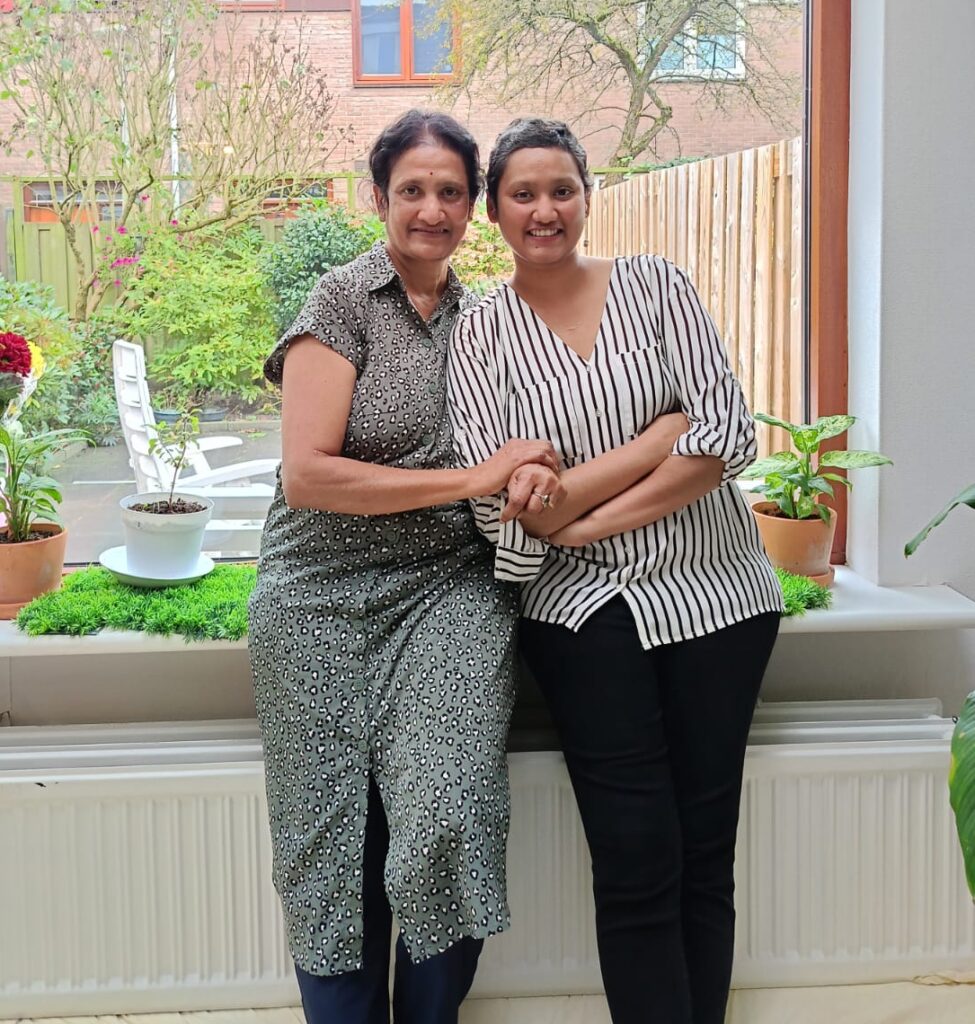
Preethi with her strongest pillar: her mother.
Boss Naari: Looking back, was there any role model, character, or moment, real or fictional, that helped you stay grounded and strong during your journey?
Preethi: When I look back, I realise I wasn’t very emotional about any of the decisions I made. Some might say that sounds odd, or think I’m detached, but that’s just how I cope. That’s my way of seeing things. After the mastectomy, they also did breast reconstruction in the same surgery. So I often call myself “Angelina Jolie” because that’s the version of strength I relate to.
If I had to name someone who inspired me the most, it would be my mother. She’s a two-time cancer survivor. Her second diagnosis came within two years of the first, but not once did I see her break down. She’s never been the “oh no, why me” kind of person. Her mindset is always, “Okay, this has happened, what do we do next?” That shaped the way I approached my own journey.
There’s also another person who left a deep impact, my husband’s boss here in the Netherlands. She too is a cancer survivor and was diagnosed at the same age as me. When she visited me, she said something that stuck: “Treat this like a project.” That really shifted my mindset. I reminded myself of that again and again , this is a project, it has a timeline, it needs effort, and it will pass.
Cancer didn’t stop my life. It just changed its rhythm. And today, I feel like I’m dancing to that rhythm, with shorter hair, a stronger heart, and a deeper love for life.
Want to be featured on NaariSpeaks?
Do you have a story that could inspire another woman or help someone going through a similar journey? We’d love to hear from you and share your voice with our community.
Liked what you read?
Sign up and get the latest blog posts delivered straight to your inbox.
We respect your privacy
Related Arcticles

Down syndrome didn’t define her; dance did
Down syndrome didn’t define her; dance did Dance became the language of Sayalee Agavane, a Down Syndrome professional dance artist who has transformed every stage

Raising a child with Down Syndrome
Raising a child with Down Syndrome Parenting a child with Down syndrome is a journey filled with unique experiences, and the early days of acceptance

Living with extra chromosomes
Living with an extra chromosome Down syndrome cannot stop anyone from achieving their dreams, and Madhumati Indalkar is a beautiful example of that. Madhumati has
